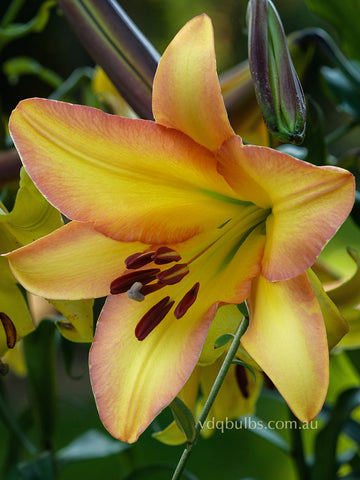Season
Yellow Brush - Lilium
Sold out.
The tiered volume pricing will be reflected in the cart page
Lilium Yellow Brush is a strong, vibrant and stunning asiatic lily. It is beautifully brush-marked with maroon has and outward facing flowers, ideal for gardens. Lilium Yellow Brush is taller and stronger than most asiatic lilies.
Aspect: Full sun to semi shade
Growing Zones: Zones 1, 2, 3 (refer to Climate Map)
Flowers: Dec;Jan
Product Type: Liliums - Tiger Hybrids
Product code: YBR
Scientific Name: Lilium hybrid
Supplied as: Bulb packed in peat
Water Wise: Yes
Colour: Yellow, Maroon
Planting Time: Jun;Jul;Aug;Sept
End Use: Garden;Cut Flower
Frost Hardy: No
Height: 75cm
Lilium: (Zones 1,2,3)
Lilies are excellent growers for the Australian climate. There are many types and forms of lilies which are relatively easy to grow and hugely rewarding. Plant your lily bulbs on arrival in well drained soil with a pH of 5.5-6.5. Position them in a half sun/half shade location. Lilies are not heavy feeders, but fertilise with blood and bone or general purpose fertiliser at planting and then apply applications of high nitrogen fertiliser soon after emergence. Plant 10-15cm deep and 20-40cm apart. Liliums do not like too much frost so keep them sheltered. Give them regular watering during the summer especially before flowering. Mulching will help to keep their roots cool. Crowding can lead to fungus outbreaks on the leaves. Allow air movement around the plants and divide clumps after a few years. The bulb will go dormant in winter and the foliage can be cut back. You can lift when the stem is dead and can be easily pulled out from the bulb, around March - July but note that they do not like to be out of the ground for long. Roots are to stay attached to the bulb, and kept moist when out of the ground. These bulbs will naturalise to form clumps over a few years, so give them room to multiply. Lilies are great in pots, plant in large pots to reduce the chance of blowing over in the wind. You will have to watch the watering much more closely in a pot. It is best to use a specific bulb potting mix.
- Nepalense Lilium: (Zone 1,2)
Nepalense like to be near dry in the winter and very cold. They are stononiferous, meaning it roves underground creating bulbs on runners and popping up where it is not expected, sometimes out of the drain hole if planted in a pot. They dislike being wet in autumn and winter. They can be wintered in just damp peat in the fridge. They require a cool climate.
- Martagon Lilium: (Zone 1,2)
These very special types of lilies require just a little extra care. They require finding or constructing very well draining soil although they will need to be kept moist. They prefer part sun, but require a cool to cold environment. Martagons are not renowned for their ease of transplanting and may take two growing seasons to give you the promised display. Follow the general lilium planting instructions above but plant martagons a bit deeper to help escape warm weather.
Lilium Growing Tips
1. Get the position right:
- a.Shade: Australia has a lot of light and increasingly hotIn our climate, lilies generally appreciate some shade, especially the roots.
- b.Air circulation: Planting the bulbs in areas with good air movement will substantially reduce the risk of fungal diseases in your foliage
2. Get the soil right:
- a. pH - generally lilies like a pH around 6. Orientals like it a bit more acid while martagons grow best at pH 7.
- b.Drainage: A lot of lilies are lost due to waterlogging in wet or over-watered situations, even in good soils.
- c. Fesrtiliser - do not go overboard, Use a general purpose fertiliser at planting and a high nitrogen fertiliser once as the shoots emerge.
3. Look after the feeder roots:
- a.Lilies obtain most of their nutrition and water from feeder roots that emerge from the stem just above the bulb a couple of weeks after emergence. These are quite shallow and easily dry out.
- b.Mulching is a great way to keep your lily roots cool and moist, increasing vigour and reducing the need to water so frequently
4. Don't forget to water:
- a.Lilies grow through the summer and are winter dormant so, while they are quite tough, they do need regular watering for good performance.
- b.Watering is especially important from emergence to flowering
5. End of season maintenance:
- a.Do not lift the bulbs unless they are too crowded or you want to move them.
- b.Cleaning up crop debris will reduce your disease risk. Either pull or cut the old stalks after the crop has died back.





















